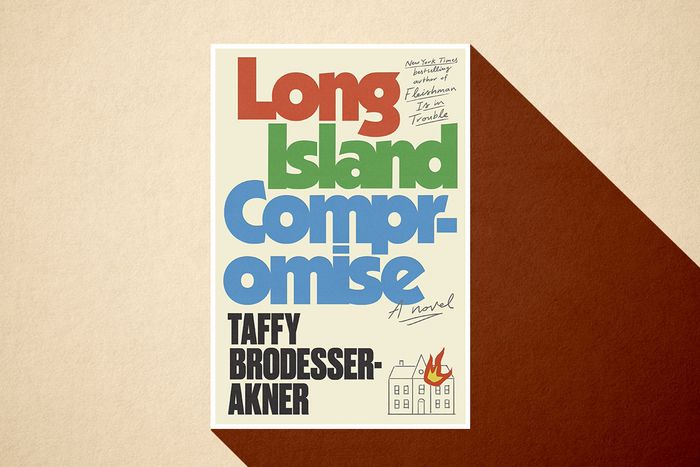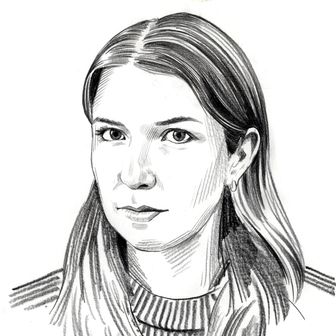
In Taffy Brodesser-Akner’s celebrity profiles, which made her name, the word want tends to appear ten or 20 or 30 times. Ethan Hawke wants his film set to feel “like a Sunday afternoon.” Kris Jenner wants, in Costco, “to pick out the salmon with the herb butter on her own.” Josh Brolin wants “to work, of course he wanted to work. But he also wanted to not hate himself in the morning.”
The implication is that Brodesser-Akner is unusually capable of burrowing into her subjects’ minds to reveal what they earnestly, embarrassingly wish for, whether that’s a certain kind of career or a certain kind of autonomy in selecting salmon. It’s not surprising, then, that she started writing novels. In fiction, for better or worse, any given character’s wants can be endless; so can an author’s mind-burrowing.
Brodesser-Akner’s appealingly antic first book, 2019’s Fleishman Is in Trouble, was about the alternately noble and perverted longings of Toby Fleishman, a nearly divorced doctor. Now, in her second novel, the Jewish American family saga Long Island Compromise, she has tripled down. Her main subject is the three wealthy Fletcher siblings, whose desires and fears have an even more infinite quality than Toby’s. The zaniness, judgmental eye, and intermittent bursts of sincerity you’ll find in her profiles are all here. So are the many markers of her prose style (lists separated by “and,” rather than commas, for example, and a generous sprinkling of exclamation points). All that familiar energy should keep the story, and the reader, moving along, but at times the novel exhausts itself. It can seem a little like a machine that won’t power down even after it has started smoking.
The book begins with a formative trauma that takes place in the early 1980s in the imagined township of Middle Rock, Long Island, a heavily Jewish enclave. In the driveway of his waterfront Tudor, Carl Fletcher, who owns a thriving polystyrene factory (“It’s political to say styrofoam. Bad reputation,” one character explains), is kidnapped. For five days, Carl’s mother, Phyllis; his pregnant wife, Ruth; and their two sons are left without a word. The gossiping, watchful citizenry of Middle Rock, all of them less rich than the Fletchers, follow along breathlessly and secretly thrill at their wealthy neighbor’s bad luck. In exchange for $250,000 in cash, Carl is finally returned to his family, convulsing and covered in his own bodily fluids. Immediately, the people around him make sure he represses the entire ugly experience. “Listen to me, boychick,” Phyllis says when he starts to cry. “This happened to your body. This did not happen to you.”
After that mad dash of a first chapter, we are shuttled forward in time to “late September just a few years ago.” Ruth and Carl, who is so traumatized he “might as well have been a sofa cushion,” are still living in Middle Rock, still wealthy, and still not talking about what happened decades earlier. The Fletcher patriarch’s apparent kidnappers are long since captured and dead. Phyllis has just died, dimly aware that her ungrateful grandchildren have not bothered to show up to her deathbed. Meanwhile in L.A., the Fletchers’ now-42-year-old middle child, Bernard (nicknamed Beamer), is hog-tied in an airport hotel room, being attended to by two dominatrix types he used his family money to hire — unbeknownst to his wife. He’s an open mouth, swallowing handfuls of Ambiens and uppers; he licks the ratty hotel carpet and a woman’s toes when instructed. Deep in the back of his mind, the kidnapping replays. The book is not subtle about the link between his father’s captivity and Beamer’s desire to be tied up.
Nor is it coy about how the aftermath of those five days affected the other two Fletcher children. After more than a hundred pages with Beamer, the narrative shifts to his elder brother, Nathan, whose naturally cautious personality has ballooned into total everyday terror. While Beamer hides his drugs and paid sex from his wife, Nathan hides an addiction to buying insurance: not just the regular kind but also “bedbug insurance, lawn insurance, earthquake insurance.” Their pretentious and guarded sister, Jenny, who fled Middle Rock and her hypercritical mother as soon as she could, is the smart, socially conscious one, but her focus is diffuse; she switches college majors about 12 times — once after deciding that art history is unethical — before landing in Yale’s economics department. There, she joins the graduate-student union, which is made up of a slightly ridiculous group of rich kids who like to call themselves “labor.” Amid all that, it turns out most of the family fortune is gone, lost to a private-equity snafu. The Fletcher child-adults, stunted by their extreme wealth, now have to figure out who they are without it.
The pathos-filled siblings can be very funny — especially Nathan, who obsessively checks his blood pressure and greets everyone with a timid “Hi-ho!” — but there’s a predetermined quality to their personalities that feels less than human. There’s not much free will in Brodesser-Akner’s world. “Like, look at what you do. You’re a union organizer,” Beamer says to his sister. “That’s really something in a family like ours. Like, it’s not an accident. From a character development point of view.” Beamer’s “fine-boned, blonde” non-Jewish wife and two children, Liesl and Wolf, are more of the same. “His marriage and family and even his job represented not just his great success but his lifelong goals,” the narrator says: “children who did not resemble his own family at any angle, and a wife who served as his very own Mayflower to take him to a new world, away from his terrified, haunted family before they drowned him off the shore.” It’s a strange way to cast intermarriage, even through narration we’re not necessarily supposed to agree with. As the daughter of a Jewish man and a non-Jewish woman, I met that line with a cringe.
Reading Long Island Compromise, I found myself papering over the Fletchers with the Roys more than a few times. The book, which Apple TV+ has already optioned for a series, invites the comparison to Succession. But unlike the Roys, the Fletchers don’t seem to have any interest in taking over Consolidated Packing Solutions, Ltd. The shabby empire at the center of the novel has more in common with the glove manufacturer in Philip Roth’s American Pastoral or the factory in Henry James’s The Ambassadors. The chemical-leaching polystyrene company is a relic and an outrage, something members of the new generation would rather bury — though they’ll happily take the money it produces.
The more time you spend with each character, the more delusional they seem to be, even as a sense of novelistic sympathy wells. Brodesser-Akner’s magpie style, layering a hum of worry with dialogue and voice-mails and scenes from mobile-phone games, has a singsongy appeal, but it can be difficult to sustain such a high-strung voice over nearly 500 pages. Beats repeat. The idealistic grad-school unionizers “sat in. They laid in. They died in,” goes one typical Taffy rhythm. A few lines earlier: “They were enraged. They had strong, definitive points of view. They had energy.”
The Fletcher kids fret endlessly over what their money has done to them, but the Fletchers’ wealth is a specific kind: It is meant to protect. The family’s trauma is the kidnapping, but it’s also the Holocaust. “Money was the solution and it was time for them to finally relax,” Ruth thinks. In a somewhat notorious Tablet article from 2015 called “I Probably Won’t Share This Essay on Twitter,” Brodesser-Akner argued against the idea of Jewish privilege in light of the 2014 Gaza war. In some ways, this is a book-length meditation on that argument, passed around from character to character. In Long Island Compromise, an antisemitic co-worker rolls his eyes when Nathan brings up the Holocaust; Jenny does the same when her grandmother does. Ah, that old idea: the naïve young Jew who sides with the oppressor. To the book’s credit, it doesn’t exactly settle on that trope, making way for an imperfect denouement that gives the older generation its own demons. It’s not an ultimately satisfying end, but it mostly works — its own kind of compromise.


